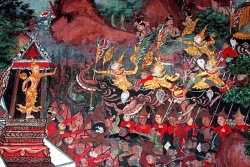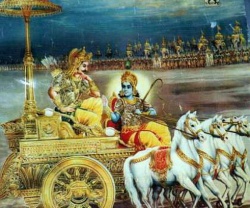Polytheism
Polytheism is the worship or belief in multiple deities usually assembled into a pantheon of gods and goddesses, along with their own religions and rituals.
Polytheism is a religious construct and a type of theism. Within theism, it contrasts with monotheism, the belief in a singular God. Polytheists do not always worship all the gods equally, but can be henotheists, specializing in the worship of one particular deity. Other polytheists can be kathenotheists, worshiping different deities at different times.
Polytheism was the typical form of religion during the Bronze Age and Iron Age, up to the Axial Age and the gradual development of monotheism or pantheism, and atheism. It is well documented in historical religions of Classical antiquity, especially Greek polytheism and Roman polytheism, and after the decline of Greco-Roman polytheism in tribal religions such as Germanic paganism or Slavic mythology. There are various polytheistic religions practiced today, for example Shintoism, Chinese folk religion, Thelema, Wicca, Druidry, Taoism, Ásatrú and Candomble. Hinduism is sometimes included in this listing; but despite the presence of polytheistic elements it is contains pantheistic and monotheism ones as well and has been classed as a "pantheism with polytheistic elements"
In Buddhism, there are higher beings commonly designed (or designated) as gods, Devas; however, Buddhism, at its core (the original Pali canon), does not teach the notion of praying nor worship to the Devas or any god(s).
However, in Buddhism, the core leader 'Buddha', who pioneered the path to enlightenment is not worshiped in meditation, but simply reflected upon. Statues or images of the Buddha (Buddharupas) are worshiped in front of to reflect and contemplate on qualities that the particular position of that rupa represents. In Buddhism, there is no creator and the Buddha rejected the idea that a permanent, personal, fixed, omniscient deity can exist, linking into the core concept of impermanence (anicca).
Devas, in general, are beings who have had more positive karma in their past lives than humans. Their lifespan eventually ends. When their lives end, they will be reborn as devas or as other beings. When they accumulate negative karma, they are reborn as either human or any of the other lower beings. Humans and other beings could also be reborn as a deva in their next rebirth, if they accumulate enough positive karma; however, it is not recommended.
Buddhism flourished in different countries, and some of those countries have polytheistic folk religions. Buddhism syncretizes easily with other religions. Thus, Buddhism has mixed with the folk religions and emerged in polytheistic variants as well as nontheistic variants. For example, in Japan, Buddhism, mixed with Shinto, which worships deities called kami, created a tradition which prays to the deities of Shinto as a form of Buddha. Thus, there may be elements of worship of gods in some forms of later Buddhism.
The concepts of Adi-Buddha and Dharmakaya are the closest to monotheism any form of Buddhism comes. All famous sages and Bodhisattvas being considered as reflections of it. Adi-Buddha is not said to be the creator, but the originator of all things, being a deity in an Emanationist sense.

